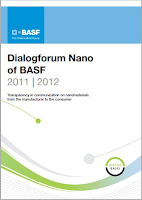 |
| See here |
On June 24th 2013, the Final Report of the Dialogforum Nano of BASF 2011/2012 was published in Brussels. More than 150 participants from all stakeholder groups discussed the recommendations for improving transparency and information from the manufacturer to the consumer.
The key contribution of the Dialogforum is the questionnaire "Seven questions for the supply chain", aimed for building up reliable information in companies. By sending the questionnaire for their suppliers, retailers and OEMs are able to compile and structure the information that they need for consumer-oriented communication:
- Information on the nanomaterial used: How can the material be characterized?
- Does the EU definition recommendation for nanomaterials apply to the material in question?
- A) How can the effect and the new functionality generated through the nanomaterial be explained? B) How can the effect and the new functionality be explained if the material in question is not a nanomaterial?
- How can the added value of the nanomaterial be described compared to other products?
- How is the risk assessment of the used material carried out? With what results?
- How is the material / product in question to be recycled / disposed of / handled at the end-of-pipe?
- Where can further information be found?
In addition, the Dialogforum participants developed specific recommendations for two application examples – textiles, paints and varnishes – and made suggestions on the form and contents of good consumer communication:
- Provision of information according to a three-level information structure
- General information on nanomaterials or nanotechnologies
- Communication of specific product information in an understandable manner
- Additional information and links
- Additional recommendations
- Use of labels to convey information
- Making information available at the point ot sale
- For retailers: Preparation of in-depth information, training personnel responsible for consumer communication accordingly
- Avoidance of company-specific terminology
- Avoidance of "nano-free" advertising
- Avoidance of references to long-known sources of exposure or to conventional materials (candle soot, milk)
In the event, Wolfgang Weber (EU Government Relations BASF Group), Jan Beringer (Hohenstein Institute), Laura Gross (Consumer Initiative), Helge Kramberger (Dr. Robert-Murjahn-Institut GmbH), Rüdiger Stegemann (Friends of the Earth Germany) and Iris Wolf (IG BCE Mining, Chemical, Energy Industrial Union) gave insights from the Dialogforum’s work. "We have learned to listen", summarised Iris Wolf the atmosphere of the mutual learning process over the past two years.
Subsequently the Dialogforum’s recommendations were discussed vividly by the audience and our guest panelists:
- Takis Daskaleros, DG SANCO
- Carolin Kranz, BASF SE
- Henrik Laursen, DG Environment
- Otto Linher, DG Enterprise and Industry
- Tatiana Santos, European Environmental Bureau
- Christos Tokamanis, DG Research and Innovation
A detailed summary of the discussions can be downloaded here.
Further information on the Dialogforum Nano of BASF:
- The Final Report Dialogforum Nano of BASF 2011/2012. Transparency in communication on nanomaterials from the manufacturer to the consumer.
- The final report of the first dialog phase 2009/2010, including communication recommendations for manufacturers and NGOs
- A general presentation of the Dialogforum, its goals and methods
- Link to the BASF SE Website "In Dialog with Society"
Fonte: Dialog Basis








